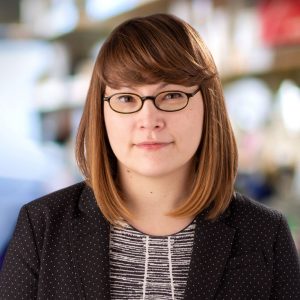
June 21, 2019
LA JOLLA—Pancreatitis is an inflammation of the pancreas that accounts for 275,000 hospitalizations in the United States annually. Patients who suffer from hereditary pancreatitis have a 40 to 50 percent lifetime risk of developing pancreatic cancer.
Salk Assistant Professor Dannielle Engle, a former Cold Spring Harbor Laboratory (CSHL) Cancer Center postdoctoral fellow, studies the progression of pancreatitis to pancreatic cancer. She has focused on a potentially powerful biomarker, a chemical structure created by complex sugar molecules called CA19-9, since CA19-9 is elevated in patients with pancreatitis and pancreatic cancer. Now, Engle and her team provide the first evidence that CA19-9 actually causes the disease it was correlated with as a biomarker, and suggest that blocking this complex sugar structure could be used therapeutically to prevent the progression from pancreatitis to pancreatic cancer. Their findings were published in the journal Science on June 21, 2019.
“This is one of those unique opportunities where prophylactic intervention of pancreatitis may lead to prevention of pancreatic cancer in at-risk patients,” Engle said.

Click here for a high-resolution image.
Credit: Salk Institute
In Cancer Center Director David Tuveson’s lab at CSHL, Engle investigated the properties of pancreatic cancer. She zeroed in on CA19-9, a complex sugar structure that coats many proteins but had not previously been ascribed with any particular function. A single enzyme controls the final step in production of CA19-9 in humans, but this enzyme is missing in rodents. Engle generated mice that produced CA19-9, and surprisingly noted that the mice developed severe pancreatitis. Engle’s findings position CA19-9 as an attractive therapeutic target for pancreatitis.
In mice, CA19-9 recruits the immune system to repair injuries from pancreatitis. Engle found that during this recruitment process, CA19-9 can also induce a cascade of biochemical reactions propelled by the release of deleterious digestive enzymes from the pancreas. This cascade opens a transformational gateway for cancer to develop and Engle also demonstrated that CA19-9 can dramatically accelerate the growth of pancreatic tumors.
“Pancreatitis is required for developing pancreatic cancer, and we might be able to prevent that transition in patients with pancreatitis by targeting CA19-9,” posited Engle. “By targeting CA19-9 with antibodies in animal models, we were able to reduce the severity of pancreatitis and even prevent it from occurring.”
A pending patent application filed by CSHL covering use of CA19-9 antibodies for the treatment and prevention of pancreatitis has been exclusively licensed to BioNTech, a German-based biotech company.
This research was funded by the Lustgarten Foundation, Pancreatic Cancer UK, National Institutes of Health (NIH), and Cold Spring Harbor Laboratory Association.
Press release materials courtesy of Cold Spring Harbor Laboratory.
About Cold Spring Harbor Laboratory:
Founded in 1890, Cold Spring Harbor Laboratory has shaped contemporary biomedical research and education with programs in cancer, neuroscience, plant biology and quantitative biology. Home to eight Nobel Prize winners, the private, not-for-profit Laboratory employs 1,100 people including 600 scientists, students and technicians. The Meetings & Courses Program annually hosts more than 12,000 scientists. The Laboratory’s education arm also includes an academic publishing house, a graduate school and the DNA Learning Center with programs for middle and high school students and teachers. For more information, visit www.cshl.edu.
About the Salk Institute for Biological Studies:
Every cure has a starting point. The Salk Institute embodies Jonas Salk’s mission to dare to make dreams into reality. Its internationally renowned and award-winning scientists explore the very foundations of life, seeking new understandings in neuroscience, genetics, immunology, plant biology and more. The Institute is an independent nonprofit organization and architectural landmark: small by choice, intimate by nature and fearless in the face of any challenge. Be it cancer or Alzheimer’s, aging or diabetes, Salk is where cures begin. Learn more at: salk.edu.
JOURNAL
Science
AUTHORS
Dannielle D. Engle, Hervé Tiriac, Keith D. Rivera, Arnaud Pommier, Sean Whalen, Tobiloba E. Oni, Brinda Alagesan, Eun Jung Lee, Melissa A. Yao, Matthew S. Lucito, Benjamin Spielman, Brandon Da Silva, Christina Schoepfer, Kevin Wright, Brianna Creighton, Lauren Afinowicz, Kenneth Yu, Robert Grützmann, Daniela Aust, Phyllis A. Gimotty, Katherine S. Pollard, Ralph H. Hruban, Michael G. Goggins, Christian Pilarsky, Youngkyu Park, Darryl J. Pappin, Michael A. Hollingsworth, David A. Tuveson
Office of Communications
Tel: (858) 453-4100
press@salk.edu